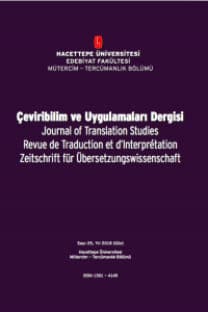Çeviride Kuramdan Uygulamaya, Kuramdan İncelemeye: Disgrace Romanının Bir İncelemesi
Bu makale, J. M. Coetzee’nin İlknur Özdemir tarafından Utanç başlığıyla Türkçeye çevrilen Disgrace romanının Jean Boase Beier’in Stylistic Approaches to Translation (2006) ve yeni baskısı Translation and Style (2019) kitaplarında sunduğu “çeviriye biçemsel yaklaşımlar” tartışması ışığında bir incelemesini sunacak. Yazıda, aynı zamanda çeviri kuramının, hem biçembilim hem de çeviribilimdeki bilişsel dönüşüm sayesinde, çevirideki deyiş kaydırmalarının J. M. Coetzee’nin Barbarları Beklerken romanının ilk Almanca çevirisini eleştirmek için kullandığı “ses”, “düşüncede ahenk”, “konuşmada ahenk” yitimi gibi günlük konuşma ifadeleriyle tartışılmasından çok öteye gittiğini göstermeyi amaçlanmaktadır. Boase-Beier, Fowler’ın “zihin biçemi” kavramından faydalanır ve çevirmeni metnin bir okuru olarak görür. Bu bağlamda çevirmen, “önceleme”lere dikkat kesilmelidir çünkü öncelemeler, çevirmenin, insanların dünyayı farklı şekillerde gördüklerini yansıtmasını mümkün kılar ve metafor, gösterim, belirsizlik, önceleme gibi biçemsel özelliklerde ifade bulur. Bu incelemede, Coetzee’nin Disgrace (1999) romanı ve 2005 yılında Can Yayınlar’ından çıkan ve İlknur Özdemir tarafından yapılan çevirisi Utanç ele alınacak, yazarın “disgrace” sözcüğünün yinelenmesi aracılığıyla yarattığı zihinsel biçemi ve Özdemir’in bunu koruma çabası betimlenecektir.
Anahtar Kelimeler:
çeviriye biçemsel yaklaşımlar, çeviri kuramı, edebiyat çevirisi
From Theory to Practice, From Theory to Analysis in Translation: An Analysis of the Novel Disgrace
This paper will present an analysis of İlknur Özdemir’s translation of J. M. Coetzee’s Disgrace (1999) into Turkish as Utanç (2005) in the light of stylistic approaches to translation as expounded by Jean Boase-Beier in her invaluable book Stylistic Approaches to Translation (2006, and the revised and expanded version Translation and Style, 2019). It aims to demonstrate that translation theory, thanks to the cognitive turn in stylistics and translation studies, has come a long way from expressing shifts in translation with everyday expressions, such as loss of “voice”, “rhythm of thought” and “rhythm of speech” that J. M. Coetzee used to criticize the first German translation of his work Waiting for the Barbarians. Resorting to Fowler’s concept of “mind style” (1977), Boase-Beier regards the translator both as a reader who should attend to the “weakly implied meanings” that make it possible to reflect how people see the world differently and that this is also expressed in linguistic choices that may be revealed in stylistic subtleties such as metaphor, iconicity, ambiguity and foregrounding. In this paper, I will analyze J. M. Coetzee’s Disgrace (2000) and its translation Utanç, translated by İlknur Özdemir and published by Can Yayınları in 2005, and demonstrate how foregrounding through repetitions of the word disgrace enables the author to depict his way of looking. The paper will also examine how Özdemir strives to preserve this in Turkish.
___
- Avery, R., Bezmez, S., Edmons, Anna G. and Yaylalı, M. (1997). Disgrace. In İngilizce-Türkçe Redhouse Dictionary (26th Edition, p. 270). SEV Matbaacılık ve Yayıncılık.
- Boase-Beier, J. (2003). Mind style translated. Style, 37(3), 253-265. http://www.jstor.org/stable/10.5325/style.37.3.253
- Boase-Beier, J. (2006). Stylistic approaches to translation, St. Jerome.
- Boase-Beier, J. (2019). Translation and style (2nd edition). Taylor and Francis.
- Coetzee, J. M. (2000). Disgrace. Vintage.
- Coetzee, J. M. (2005a), Roads to translation. Meanjin, 64(4), 141-51.
- Coetzee, J. M. (2005b). Utanç (İ. Özdemir, Trans.). Can Yayınları.
- Dictionary.com. (n.d.). Piquant. In Dictionary.com. Retrieved November 10, 2022, from https://www.dictionary.com/browse/piquant.
- Fowler, R. (1977). Linguistics and the novel. Methuen.
- Fowler, R. (1986). Linguistic criticism. Oxford University Press.
- Fowler, R. (1996). Linguistic criticism (2nd edition). Oxford University Press.
- McElroy, J. (2000, March 6). Salvation in South Africa, The Nation. https://www.thenation.com/article/archive/salvation-south-africa/
- Merriam-Webster (n.d). Disgrace. In Merriam-Webster Dictionary. Retrieved November 10, 2022, from https://www.merriam-webster.com/dictionary/disgrace.
- Popovic, A. (1971). The concept of shift of expression. In J. Holmes (Ed.), The nature of translation (pp. 78-89). Gruyter Mouton.
- Semino, E., & Culpeper, J. (2002). Foreword. In E. Semino & J. Culpeper (Eds.), Cognitive stylistics: Language and cognition in text analysis (pp. ix-xvi). John Benjamins.
- Shapiro, L. (1999, Nov 22). African anger: A booker prize winner. Newsweek (Pacific Edition), 134 (21), 56..
- Türk Dil Kurumu Genel Türkçe Sözlük. (n.d.). Utanç. In TDK Genel Türkçe Sözlük. Retrieved November 10, 2022, from https://sozluk.gov.tr/
- Türk Dil Kurumu Genel Türkçe Sözlük. (n.d.). Utanmak. In TDK Genel Türkçe Sözlük. Retrieved November 10, 2022, from https://sozluk.gov.tr/
- Williams, S. (1999). Book reviews. African Business, 248, 42.
- Yayın Aralığı: Yılda 2 Sayı
- Başlangıç: 1991
- Yayıncı: Hacettepe Üniversitesi
Sayıdaki Diğer Makaleler
Çeviride Kuramdan Uygulamaya, Kuramdan İncelemeye: Disgrace Romanının Bir İncelemesi
Uzaktan Sözlü Çeviride (USÇ) Ergonomi: Zoom Kullanımına Çevirmen Bakış Açısı
Kültür Çevirisi Kavramına Felsefi bir Yaklaşım
Sayfadan Sahneye, Dilden Çok-modluluğa: Edebi Metinlerden Sahne Uyarlamaları
‘Kaplan Gözü Maceraları’ Çeviri Çocuk Kitaplarında Çevirmen Kararları
İkilik Dışı Cinsel Kimliklerin Görsel-İşitsel Çeviride Yansıtımına İlişkin Sorun Odaklı Bir Yaklaşım
F. Schleiermacher’in Diyalektik Yaklaşımının Çeviri Yaklaşımına Etkisi
Uluslararası Sağlık Örgütlerinin Türkçeye Çevirisinin ve Kısaltmalarının İncelenmesi
